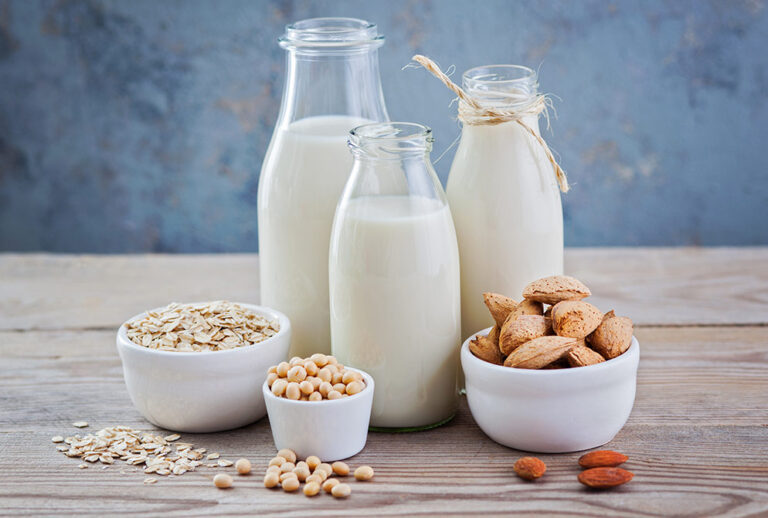
With growing concerns about climate change and resource depletion, many people are looking to make lifestyle choices that reduce their environmental footprint. One of the simplest changes is switching from traditional dairy milk to plant-based alternatives. Choosing plant-based milk, such as almond, soy, oat, or coconut, offers several environmental benefits, making it a sustainable and eco-friendly option. Let’s explore the environmental impact of dairy milk compared to plant-based milk, and see how a simple choice can make a meaningful difference.
Why Consider Switching to Plant-Based Milk?
The environmental impact of traditional dairy farming is substantial. From greenhouse gas emissions to land and water usage, dairy milk production places a heavy burden on our planet. In comparison, plant-based milk production is generally much more sustainable. Here are a few key reasons why making the switch matters:
- Reduced Greenhouse Gas Emissions
Dairy production is responsible for a significant portion of agricultural greenhouse gas emissions, especially methane from cows. Plant-based milks produce fewer emissions, helping to slow down climate change. - Lower Water Consumption
Producing one glass of dairy milk requires over 100 gallons of water. vegan milks, on the other hand, generally need far less water, making them a more water-efficient choice. - Less Land Use
Dairy farming requires large areas of land to raise cows and grow their feed. vegan milk production, especially with types like almond and oat, uses significantly less land, which reduces deforestation and biodiversity loss.
Environmental Impact of Different Types of Plant-Based Milk
Each vegan milk has a unique environmental footprint. Let’s look at how popular options like almond, soy, oat, and coconut milk compare to each other and to dairy milk in terms of sustainability.
Almond Milk
Almond milk has become one of the most popular dairy alternatives. While it uses more water than other plant-based options, its greenhouse gas emissions and land use are relatively low compared to dairy. Most almonds are grown in California, which raises concerns due to the state’s frequent droughts, but almond milk still has a much lower overall impact than dairy milk.
Soy Milk
Soy milk is highly efficient in terms of land and water use and produces significantly fewer emissions than dairy. However, there is concern about deforestation in areas where soy is grown. Choosing organic soy milk from sustainably sourced farms can help address this issue.
Oat Milk
Oat milk is among the most environmentally friendly vegan milks due to its low water and land use. Oats are a hardy crop that grows in various climates, making them less resource-intensive. This makes oat milk an excellent choice for those looking to reduce their impact on the environment.
Coconut Milk
Coconut milk has a low water and land footprint, as coconut trees are typically grown in tropical climates that don’t require irrigation. However, demand for coconut products has led to increased farming, raising concerns about biodiversity and fair trade practices. Choosing responsibly sourced coconut milk can help support sustainable coconut farming.
Comparing the Carbon Footprint of Dairy Milk and Plant-Based Milk
One of the most compelling reasons to choose vegan milk is the reduction in carbon emissions. Studies show that producing dairy milk emits roughly three times the carbon dioxide of most plant-based alternatives. Here’s how plant-based milks compare to dairy in terms of greenhouse gases:
- Dairy Milk: Produces high levels of greenhouse gases, especially methane from cows.
- Almond Milk: Generates around 0.14 kg of CO₂ per liter, which is much lower than dairy.
- Soy Milk: Emits about 0.15 kg of CO₂ per liter, making it another low-emission option.
- Oat Milk: Has one of the lowest carbon footprints at around 0.18 kg of CO₂ per liter.
Switching from dairy to plant-based milk can significantly reduce your carbon footprint, making it an impactful and accessible choice for environmentally-conscious consumers.
also visit Maiva Fresh Introduces New Health Drinks Range: Nutritious, Delicious, and Fresh
The Importance of Ethical Sourcing in Plant-Based Milk Production
While plant-based milk is better for the environment overall, ethical sourcing is key to ensuring it remains sustainable. Here’s how you can make environmentally responsible choices when selecting vegan milk:
- Look for Certified Organic Options
Organic farming practices reduce the use of harmful pesticides and promote biodiversity. Choosing organic vegan milk can help ensure sustainable farming practices. - Support Fair Trade Brands
Many Vegan milk options, like coconut and almond, rely on crops that can impact local communities. Supporting brands that engage in fair trade practices helps protect both the environment and the livelihoods of farmers. - Check for Sustainable Packaging
Consider the packaging of your vegan milk. Opting for brands that use recyclable or biodegradable materials helps reduce plastic waste.
How Your Choice Makes a Difference
Switching to plant-based milk may seem like a small change, but collectively, it has the potential to make a significant positive impact on the environment. Here’s a quick look at how each choice contributes to sustainability:
- Reducing Deforestation
Opting for vegan milk reduces the demand for large-scale dairy farms, which can contribute to deforestation and habitat loss. - Conserving Water
Plant-based milk, especially oat and soy, uses far less water than dairy. This is particularly important in water-scarce regions. - Decreasing Emissions
vegan milk alternatives produce a fraction of the emissions generated by dairy farms. Switching helps decrease overall greenhouse gas emissions, slowing down global warming.
Conclusion
Choosing vegan milk over dairy is a simple yet powerful way to reduce your environmental footprint. With options like almond, soy, oat, and coconut milk, you can find a variety that fits your taste and sustainability goals. Each vegan milk offers unique benefits, but all contribute to a lower-carbon, resource-efficient, and eco-friendly future. Start making a positive impact today by exploring plant-based milk options and supporting brands that prioritize ethical and sustainable practices.